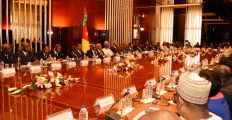Categories
Recent Posts
- Race for the Unity Palace: Kamto’s strategy sparks clash ahead of election
- CEMAC introduces new coins, including a CFA200 piece
- Football: Real Madrid manager Ancelotti testifies in court over tax charges
- Manyu Division: Ma Nchong Stella is the new Ekandim Nkanda of Ntenako
- CPDM Crime Syndicate: Biya’s acolytes expected to fill bureau vacancies
Archives
- April 2025
- March 2025
- February 2025
- January 2025
- December 2024
- November 2024
- October 2024
- September 2024
- August 2024
- July 2024
- June 2024
- May 2024
- April 2024
- March 2024
- February 2024
- January 2024
- December 2023
- November 2023
- October 2023
- September 2023
- August 2023
- July 2023
- June 2023
- May 2023
- April 2023
- March 2023
- February 2023
- January 2023
- December 2022
- November 2022
- October 2022
- September 2022
- August 2022
- July 2022
- June 2022
- May 2022
- April 2022
- March 2022
- February 2022
- January 2022
- December 2021
- November 2021
- October 2021
- September 2021
- August 2021
- July 2021
- June 2021
- May 2021
- April 2021
- March 2021
- February 2021
- January 2021
- December 2020
- November 2020
- October 2020
- September 2020
- August 2020
- July 2020
- June 2020
- May 2020
- April 2020
- March 2020
- February 2020
- January 2020
- December 2019
- November 2019
- October 2019
- September 2019
- August 2019
- July 2019
- June 2019
- May 2019
- April 2019
- March 2019
- February 2019
- January 2019
- December 2018
- November 2018
- October 2018
- September 2018
- August 2018
- July 2018
- June 2018
- May 2018
- April 2018
- March 2018
- February 2018
- January 2018
- December 2017
- November 2017
- October 2017
- September 2017
- August 2017
- July 2017
- June 2017
- May 2017
- April 2017
- March 2017
- February 2017
- January 2017
- December 2016
- November 2016
- October 2016
- September 2016
- August 2016
- July 2016
- June 2016
Featured
Most Commented Posts
 4 Anglophone detainees killed in Yaounde
4 Anglophone detainees killed in Yaounde
18 comments Chantal Biya says she will return to Cameroon if General Ivo Yenwo, Martin Belinga Eboutou and Ferdinand Ngoh Ngoh are sacked
Chantal Biya says she will return to Cameroon if General Ivo Yenwo, Martin Belinga Eboutou and Ferdinand Ngoh Ngoh are sacked
13 comments The Anglophone Problem – When Facts don’t Lie
The Anglophone Problem – When Facts don’t Lie
12 comments Anglophone Nationalism: Barrister Eyambe says “hidden plans are at work”
Anglophone Nationalism: Barrister Eyambe says “hidden plans are at work”
12 comments Largest wave of arrest by BIR in Bamenda
Largest wave of arrest by BIR in Bamenda
10 comments
Latest Tweets
Featured
-

Race for the Unity Palace: Kamto’s strategy sparks clash ahead of election
-

CEMAC introduces new coins, including a CFA200 piece
-

Football: Real Madrid manager Ancelotti testifies in court over tax charges
-

Manyu Division: Ma Nchong Stella is the new Ekandim Nkanda of Ntenako
-

CPDM Crime Syndicate: Biya’s acolytes expected to fill bureau vacancies
-

Yaoundé spent CFA311bn on interest payments for central government debt in 2024
-

President Putin begins biggest Russian military call-up in years
© Cameroon Concord News 2025





26, February 2018
Biya regime extends curfew in Southern Cameroons 0
The governor of the North West region has extended a curfew restricting movement of persons and property from 8PM to 6AM, a decision he says was taken because of ‘growing threats of secessionist activists against the forces of law and order’.
The curfew which was first imposed in the Anglophone Northwest and Southwest regions two weeks ago has been extended for a week.
The week long curfew is renewable in the ‘quest for a long lasting return to normalcy’.
The security forces in the North West region including the recently created military region based in Bamenda, are charged with implementing the curfew.
Cameroon’s Anglophone crisis
What began in 2017 as peaceful protests by Anglophone activists against perceived marginalization by Cameroon’s Francophone-dominated elite has become the gravest challenge yet to President Paul Biya, who is expected to seek to renew his 35-years in power in an election next year.
Government repression – including ordering thousands of villagers in the Anglophone southwest to leave their homes – has driven support for a once-fringe secessionist movement, stoking a lethal cycle of violence.
The secessionists declared an independent state called Ambazonia on Oct. 1. Since then, violent scenes that have resulted in loss of lives for both the secessionists and government forces have played out in the Northwest region, whose capital is Bamenda.
At the end of World War One, Germany’s colony of Kamerun was carved up between allied French and British victors, laying down the basis for a language split that still persists.
English speakers make up less than a fifth of the population of Cameroon, concentrated in former British territory near the Nigerian border that was joined to the French-speaking Republic of Cameroon the year after its independence in 1960. French speakers have dominated the country’s politics since.
Source: Africa News